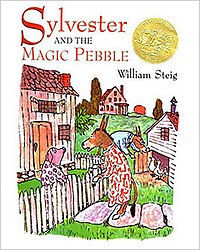William Steig may be more well-known for a certain big green ogre, but my personal pick from his oeuvre has always been the tale of a donkey whose wish turns out to have unexpected consequences. Sylvester and the Magic Pebble was published in 1969, when Steig was in his 60s; though he came to children's books late in life, he displayed an incredible sense of how to write and illustrate books that speak to children. Sylvester won the Caldecott in 1970, and it's easy to see why - the emotional depth and range that Steig brings to his characters in the text is multiplied exponentially through his deceptively simple illustrations.
Sylvester was actually challenged in 12 states due to Steig's depiction of the police as pigs, something that surprised me a bit since it's not an aspect that jumped out at me at any point in the reading of this picture book. But books have been challenged for a lot less, after all. In Steig's Caldecott acceptance speech, he said that "(a)rt, including juvenile literature, has the power to make any spot on earth the living center of the universe; and unlike science, which often gives us the illusion of understanding things we really do not understand, it helps us to know life in a way that still keeps before us the mystery of things. It enhances the sense of wonder. And wonder is respect for life." Really, I think that's the larger point of all Steig's work, porcine law enforcement officers notwithstanding.
The plot of Sylvester is a perfect marriage of the mundane and the magical. Sylvester is a young donkey in search of pebbles for his collection. He finds an unusual one on a particularly rainy afternoon; still holding the pebble in his hoof, Sylvester thinks, "I wish it would stop raining". To his great surprise, it does, instantly. That the pebble is magic can be of no doubt. Sylvester accepts it as easily as any reader will. And he rejoices in his find, until he stumbles upon a nasty lion with a hungry look in his eyes. Panicking, Sylvester wishes he was a rock, and, being that he's holding the pebble, he of course immediately transforms. And such is Sylvester's dilemma: as a rock, he cannot possibly reach out and pick up the pebble, in order to wish himself back to donkey-dom.
I brought Sylvester home thinking it would be new for Sprout but to my great delight he said, "Oh, Sylvester! I like this one, Mama." Turns out his daycare teacher reads it often, and he knew the entire thing practically (at least the action). At the part where Sylvester turns into a rock, Sprout very gently tapped the page and said, "He's in there, Mama. It's okay," as if to reassure me. We've read it just about every night for the past week, and I can honestly say that I think Sylvester himself magic - Sprout's fallen asleep during almost every reading, preempting the nightly pleas for "one more story" and "need a drink". Gold, Mr. Steig. Pure gold.
Sylvester's on the long side, so best shared with preschoolers on up. Littler ones will enjoy the pictures but might miss out on the subtleties of the story, of which there are many. There's more than a bit of pathos here as we watch Sylvester's distraught parents come to terms with their son's disappearance. That in itself could be hard for younger children to grasp, but they will pick up on the jubilation with which his parents greet Sylvester, once he is at last transformed back into his natural state. And that's one of the best scenes in the book, in my estimation - the sun shining forth with a brilliant burst of light, as Sylvester's father dances with glee and his mother embraces her beautiful boy. It's absolutely heartwarming.
Sylvester may have been written more than 40 years ago but its lessons are just as relevant today - that when those we love are lost, we mourn them deeply. And if we are fortunate enough for them to come back to us, we should throw ourselves into celebration that is joyful and complete. That's a powerful thing for all readers to consider. Well, that and if you're ever holding a magic pebble, for God's sake don't wish you're a rock.
Wayback Wednesday Verdict? Holds up nicely
Sylvester and the Magic Pebble by William Steig, published by Simon and Schuster
Ages 3-7
Source: Library
Sample: "He imagined all the possibilities, and eventually he realized that his only chance of becoming himself again was for someone to find the red pebble and to wish that the rock next to it would be a donkey. Someone would surely find the red pebble -- it was so bright and shiny -- but what on earth would make them wish that a rock were a donkey? The chance was one in a billion at best."
Highly recommended
Bonus: William Steig's Caldecott acceptance speech (and a letter expressing his trepidation at making such a speech) from Letters of Note



No comments:
Post a Comment